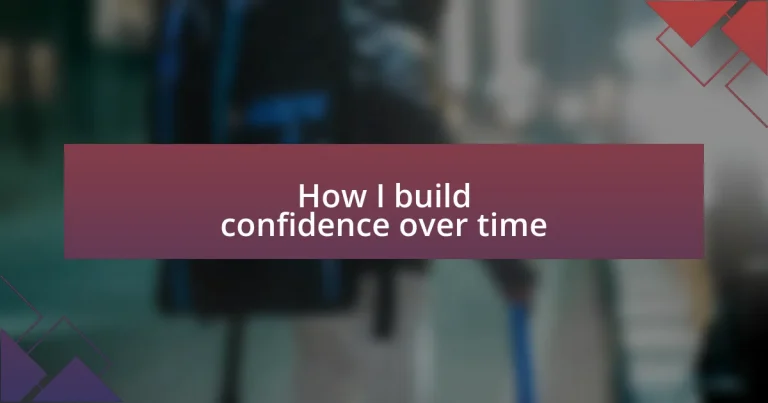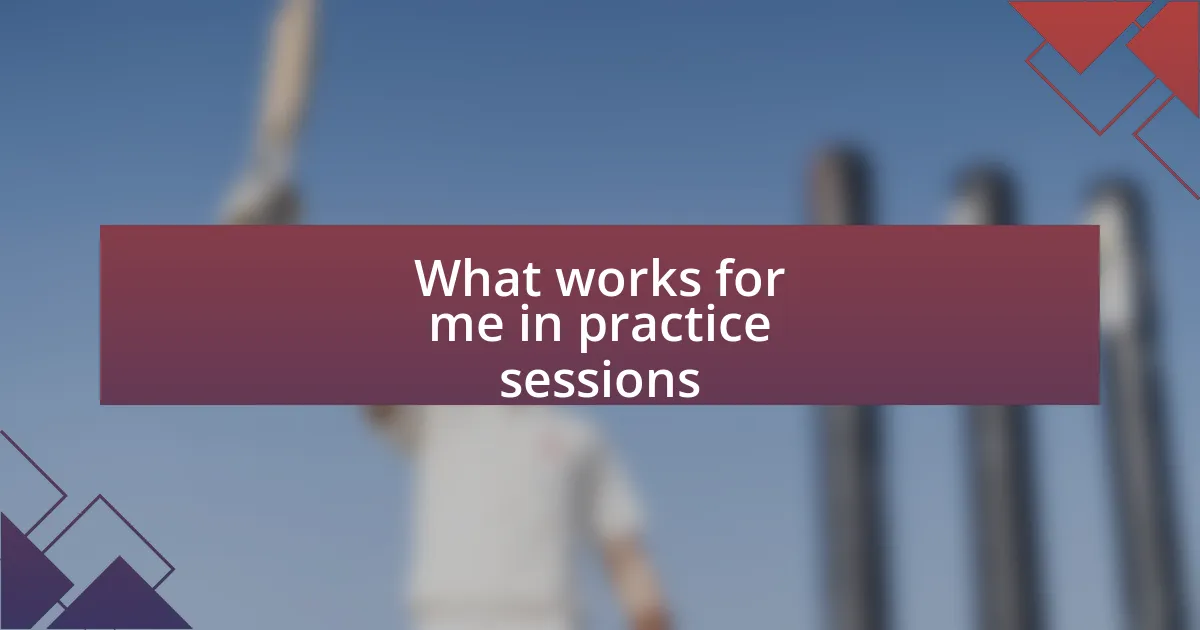Key takeaways:
- Confidence is a skill developed over time, focusing on self-compassion and celebrating small wins.
- Self-awareness enhances confidence by helping individuals understand their strengths, weaknesses, and triggers for self-doubt.
- Setting specific, achievable goals fosters a positive mindset and builds momentum in personal growth.
- Seeking constructive feedback and recognizing small victories are crucial for transforming setbacks into opportunities for growth.
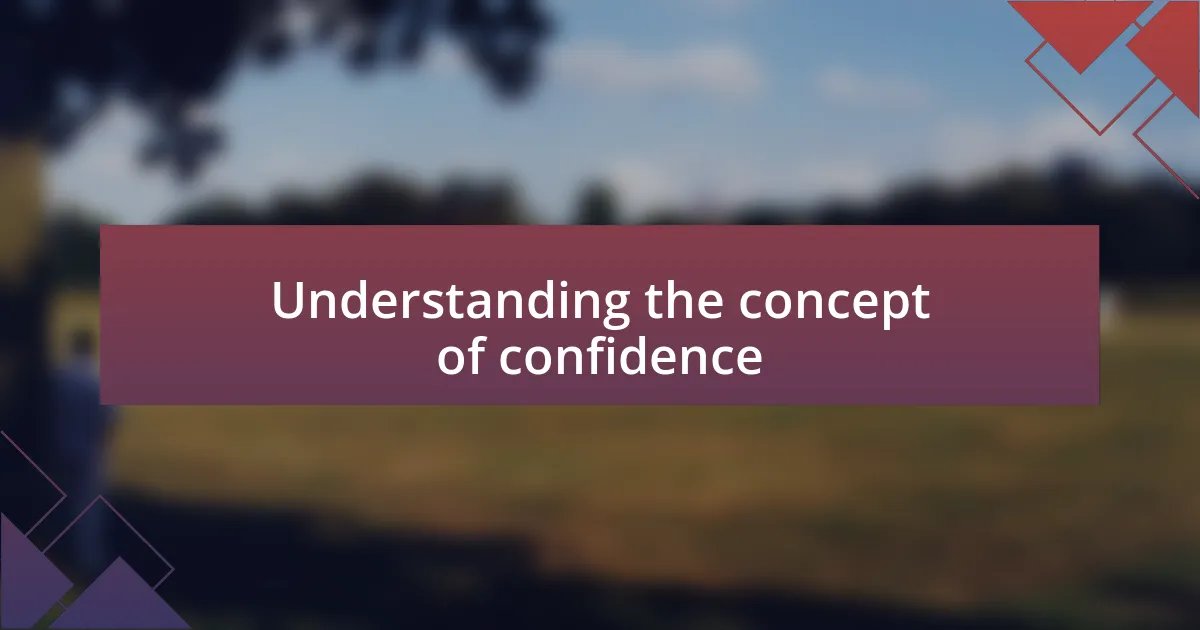
Understanding the concept of confidence
Confidence is often perceived as a trait that some people just seem to possess, but in my experience, it’s more of a skill that can be developed over time. I remember when I started public speaking; my hands would shake and my voice would tremble. It felt like a mountain in front of me. But, I began to realize that confidence isn’t about being fearless—it’s about pushing through that initial fear to find my voice.
One key aspect of confidence is understanding that it’s not a destination but a journey. There were times when I felt like I had taken two steps forward only to stumble back. Have you ever had those moments where it felt like progress was just out of reach? During those times, I learned to celebrate small wins, which slowly built a solid foundation of self-assurance.
Another interesting point is that confidence also involves how we perceive ourselves. There were days when negativity clouded my thoughts, making it hard to see my worth. I had to ask myself, “What would I say to a friend in this situation?” Once I shifted my focus towards self-compassion and positive affirmations, I noticed a significant boost in how I viewed my capabilities. It’s empowering to realize that the way I think about myself shapes my confidence level.
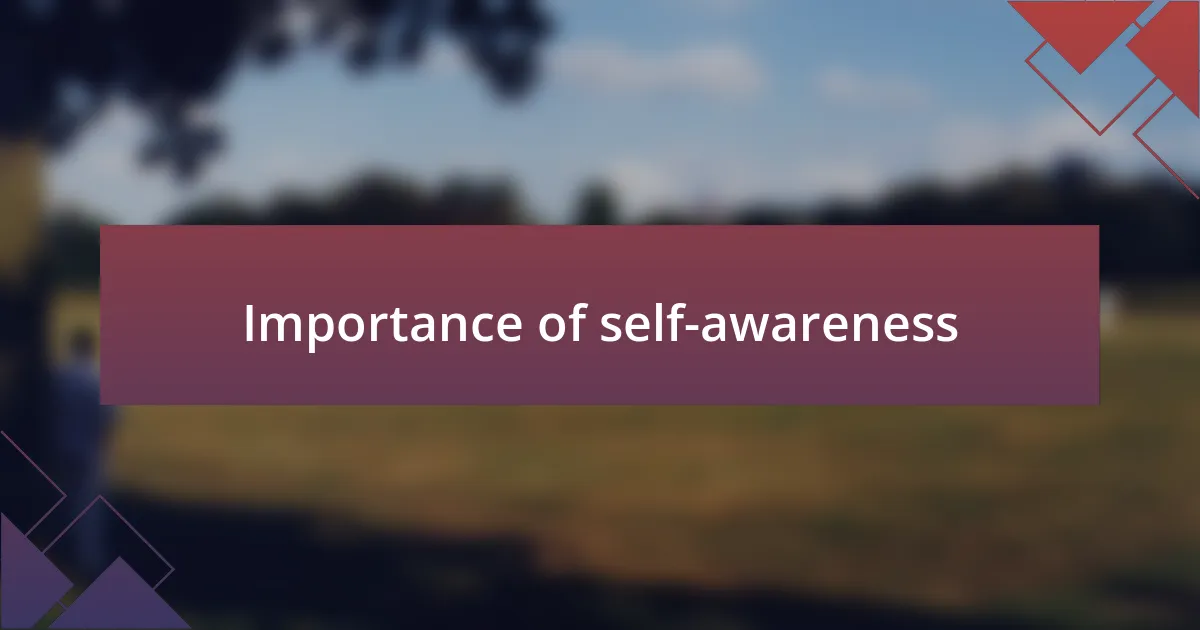
Importance of self-awareness
Self-awareness plays a crucial role in building confidence. It’s like having a mirror that reflects not just your strengths but also your areas for growth. I remember a time when I was unaware of how much my self-doubt was impacting my interactions. Once I started to recognize my triggers—like negative self-talk during group discussions—I was able to address and manage those feelings.
Here are some key reasons why self-awareness is essential for building confidence:
-
Understanding Strengths and Weaknesses: I found that acknowledging my strengths helped me tackle challenges with greater assurance, while recognizing my weaknesses allowed me to seek improvement without fear.
-
Recognizing Triggers: By identifying situations that trigger anxiety or self-doubt, I could develop strategies to cope and feel more grounded.
-
Streamlining Growth: With a clear sense of self, I was able to set more realistic goals. This focused approach made every small achievement feel like a giant leap forward.
Self-awareness encourages a continuous cycle of reflection and growth. The more I understood myself, the more I could see how my thoughts and feelings influenced my confidence. Each insight became a stepping stone toward a stronger, more authentic version of myself.
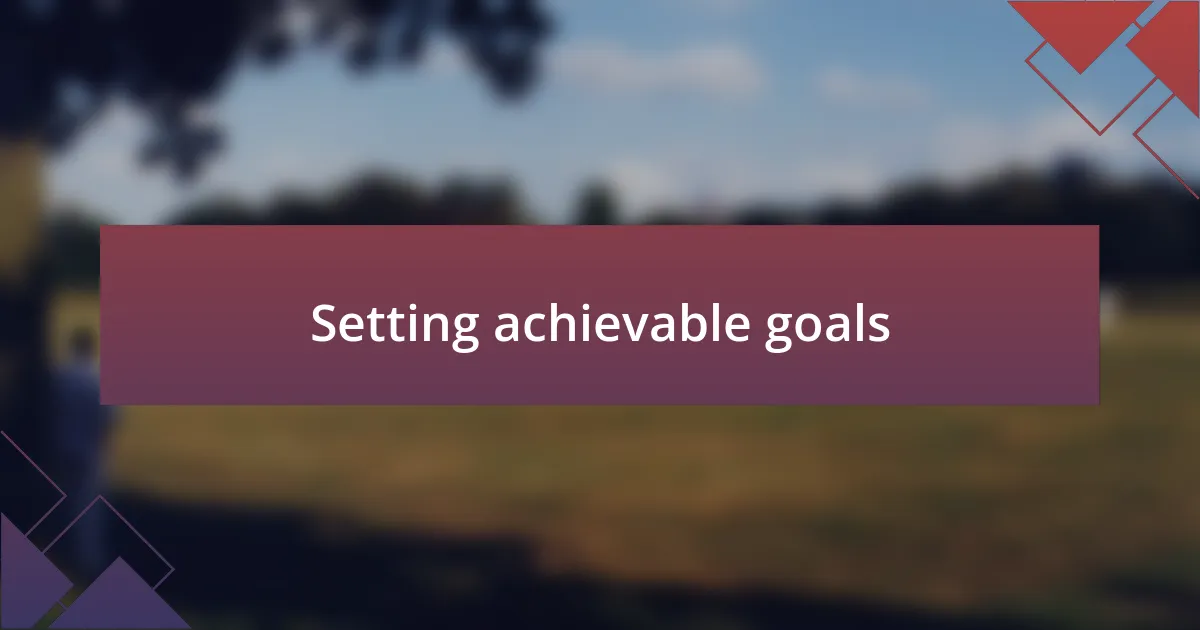
Setting achievable goals
Setting achievable goals has been a game-changer for my confidence. When I first started setting goals, I often aimed too high and quickly became discouraged. I remember one instance where I aimed to run a marathon without having run any long distances before. It wasn’t until I broke the goal into smaller, manageable steps—like running a mile without stopping—that I began to build momentum. This gradual approach made it not only less daunting but also a lot more rewarding.
I learned that setting small, achievable goals can significantly boost self-confidence. By celebrating each small success, I began to shift my mindset. There were times when I felt overwhelmed, but then, I’d look back at how far I’d come, reminding myself that these milestones were all part of a bigger journey. For me, this made the process enjoyable rather than stressful, fueling a desire to set even more goals.
Through my experience, I’ve found that specificity in goal-setting is incredibly beneficial. Instead of saying, “I want to be healthier,” I would specify, “I will walk for 20 minutes a day, three times a week.” This clarity not only makes the goal more achievable but it also provides clear benchmarks for progress. Over time, I’ve realized that each small goal accomplished reinforces the belief that I can take on bigger challenges, steadily building my confidence.
| General Goals | Achievable Goals |
|---|---|
| Run a marathon | Run 1 mile without stopping |
| Get fit | Walk for 20 minutes, three times a week |
| Learn a new language | Learn 10 new words every week |
| Start a business | Create a business plan in a month |
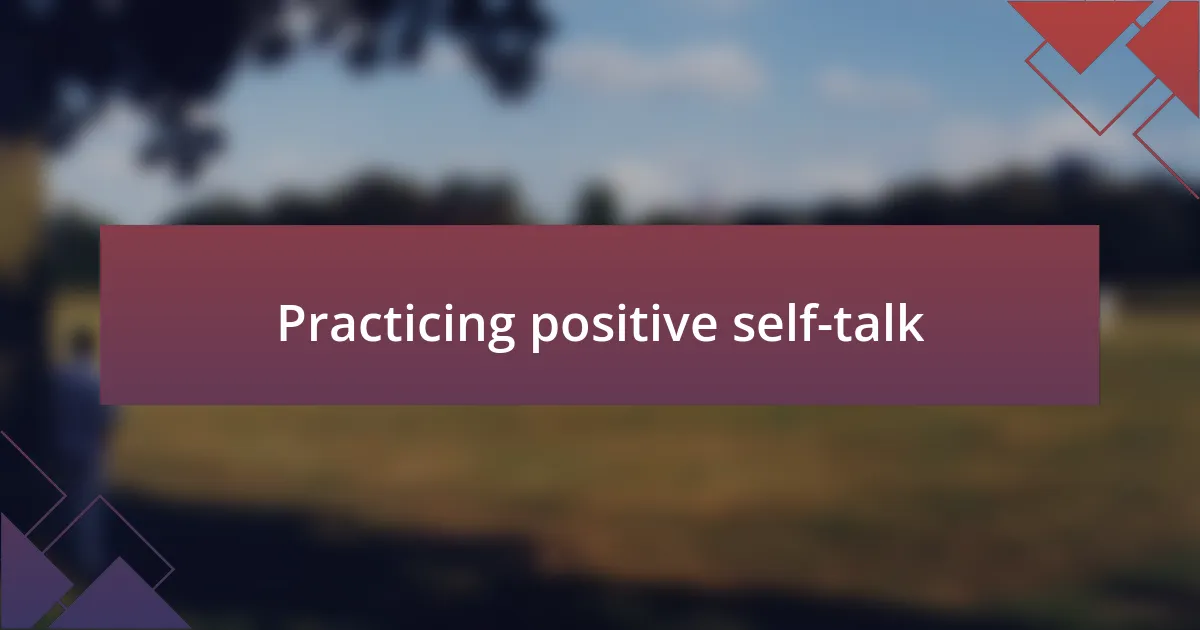
Practicing positive self-talk
Practicing positive self-talk has been a transformative part of my journey. At one point, I caught myself spiraling into negative thoughts, especially before challenging situations. I started to question whether I was good enough or capable, which only made things worse. I remember standing in front of the mirror before a big presentation, and instead of focusing on my fears, I began to say, “I am prepared, and I can do this.” That simple shift allowed me to face the room with more confidence.
Initially, it felt awkward to speak kindly to myself. I had to push through the discomfort of changing my inner dialogue. But I found that using mantras like “I am worthy” or “I can learn from mistakes” became uplifting reminders throughout my day. Whenever I felt self-doubt creeping in, I would repeat these phrases, and slowly, they started to reshape my outlook. It’s fascinating how a bit of self-kindness can shift your perspective entirely, don’t you think?
Over time, I’ve made it a point to write down positive affirmations in a journal. Reflecting on my strengths and accomplishments helps reinforce the belief that I can take on new challenges. One evening, I wrote down the phrase, “I embrace my uniqueness.” Just writing it felt liberating, as if I was releasing the weight of comparison. This practice has taught me that positive self-talk isn’t about ignoring flaws; it’s about recognizing and celebrating what makes me, me.
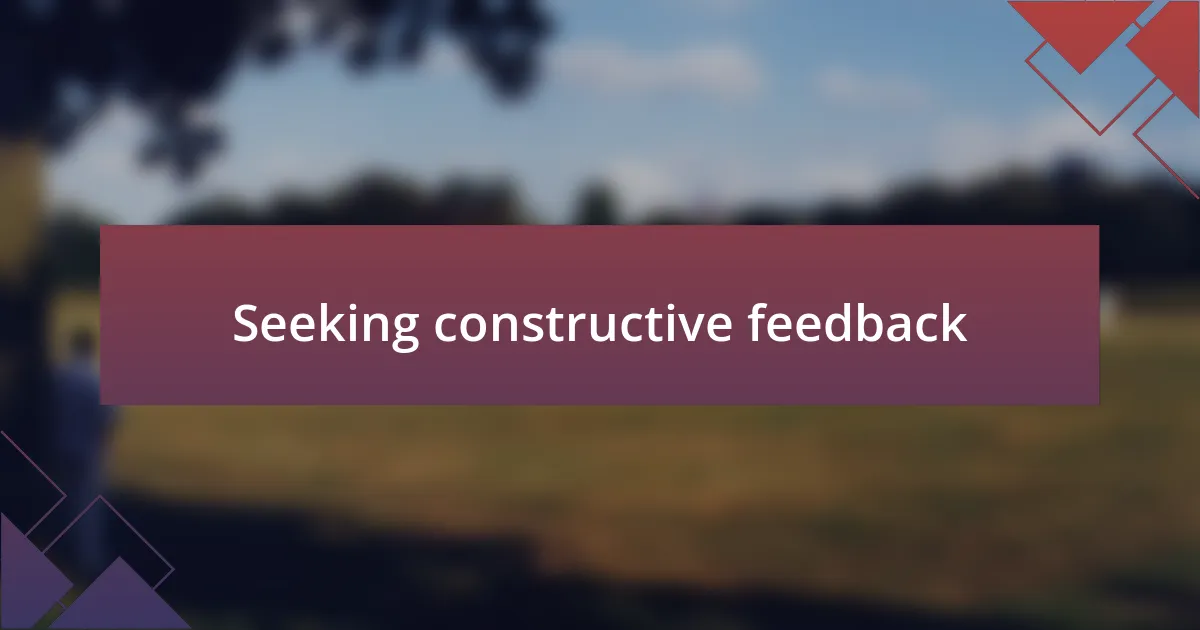
Seeking constructive feedback
Seeking constructive feedback has been one of the most pivotal strategies in my confidence-building journey. I remember a time when I was struggling with a project at work and decided to ask a trusted colleague for their input. Their insights were not just helpful; they were a revelation. By embracing their perspective, I learned to view my work through a different lens, which ultimately improved my performance and boosted my self-esteem.
People often hesitate to ask for feedback because they fear criticism, but I’ve come to realize that constructive feedback is a gift. I once received feedback on a presentation that highlighted both my strengths and areas for improvement. Initially, it stung a little, but when I took a step back, I recognized that it was an opportunity to grow. Why shy away from valuable insights that can propel you forward? This mindset shift transformed my approach and opened doors to continual development.
Integrating feedback into my routine has made a significant difference. I now actively seek it after every major task or presentation, turning what used to be a source of anxiety into an engaging dialogue. One time, after a particularly challenging meeting, I invited members of my team to share their thoughts. The collaborative environment that emerged not only enriched my understanding but also fostered trust and respect among us. How can you assist yourself in building confidence through the eyes of others? By welcoming feedback, you’re essentially opening up a pathway to learning and growth, and each piece of feedback becomes a stepping stone toward greater self-assurance.
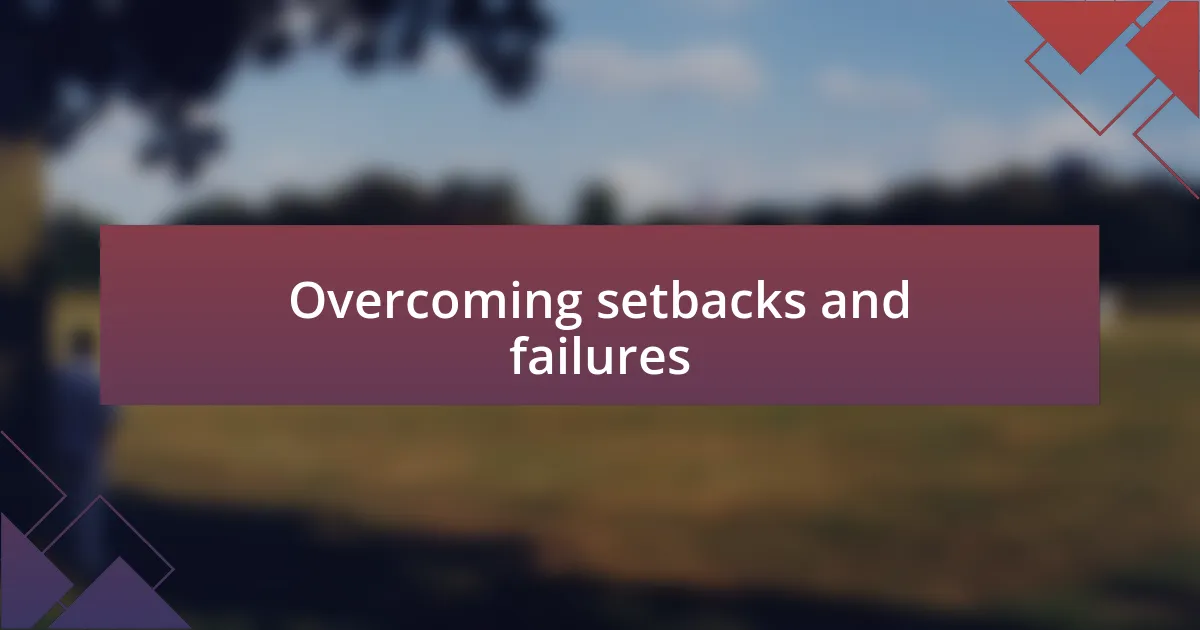
Overcoming setbacks and failures
Experiencing setbacks and failures is an inevitable part of any personal growth journey. I recall a time when I missed a critical deadline at work, and the disappointment I felt was palpable. Initially, it was difficult to shake off that feeling, but I chose to see it as a learning opportunity. Wasn’t it a chance to analyze what went wrong and devise a plan to ensure it didn’t happen again? That perspective shifted my mindset from dwelling on the failure to focusing on actionable improvement.
Navigating through failure isn’t just about what went wrong; it’s also about understanding the emotions that accompany it. After facing a major setback, I would often find myself grappling with self-doubt. But reflecting on those moments revealed that my emotions were a natural response and not a reflection of my overall abilities. I started to journal my feelings, and over time, I discovered that acknowledging my emotions could lead to deeper insights, transforming those moments of despair into powerful motivators.
I remember a time when a failed project taught me resilience. Instead of curling up in defeat, I gathered my team, and we dissected every aspect of what went awry. This collaborative approach not only helped me regain my confidence but also strengthened our team bond. How often do we overlook the value of teamwork in overcoming personal challenges? In those moments, I learned that setbacks could serve as a foundation for rebuilding, allowing me to emerge stronger and more self-assured.
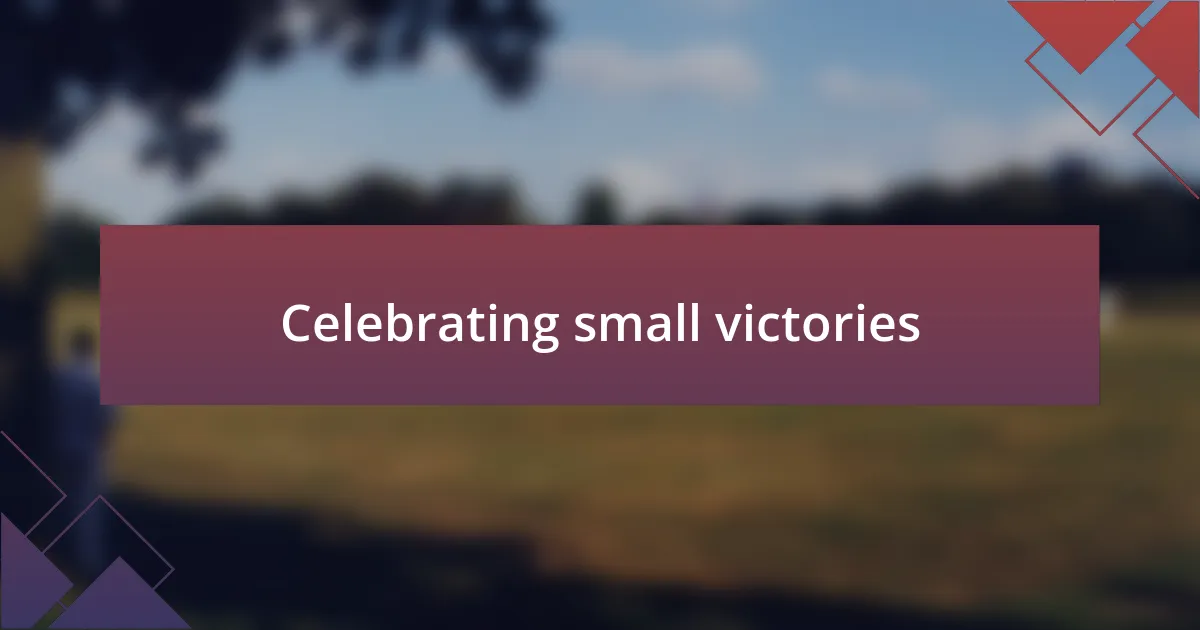
Celebrating small victories
Recognizing and celebrating small victories can be a game changer in building confidence over time. I still remember when I decided to tackle my public speaking fears. Each time I successfully presented a small idea in meetings, I would take a moment to acknowledge that achievement. It felt rewarding, almost exhilarating, to recognize that each tiny step counted. Why overlook those moments when they add up to significant growth?
Additionally, these celebrations don’t always have to be grand; sometimes, a simple acknowledgment is enough. For instance, completing a challenging task on my to-do list used to seem mundane, but I realized that it was worth highlighting. I started treating such moments like mini-celebrations—throwing a mental high-five to myself or even sharing my accomplishment with a friend. How often do we brush aside our achievements, thinking they don’t measure up? I’ve learned that celebrating those small wins builds a positive feedback loop that fuels my motivation and confidence.
In my experience, keeping a victory journal has been invaluable. Each night, I jot down three small victories from the day, no matter how trivial they may seem. This practice not only fosters gratitude but also reinforces my progress over time. Have you ever looked back and realized how far you’ve come, just by putting one foot in front of the other? By documenting these small steps, I’ve discovered a tangible way to track my growth. Embracing these victories makes the journey toward confidence much more enjoyable and fulfilling.
